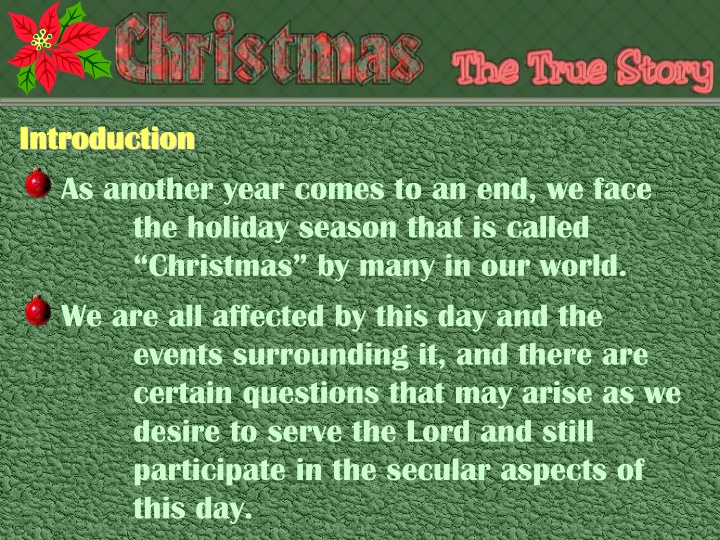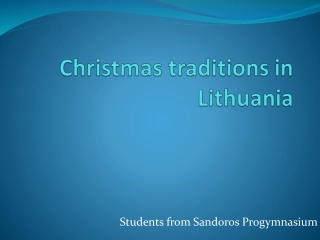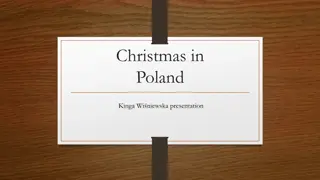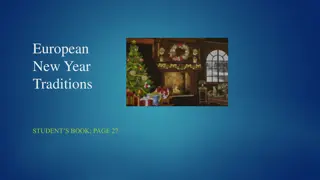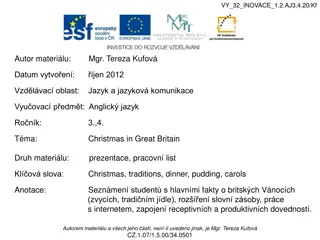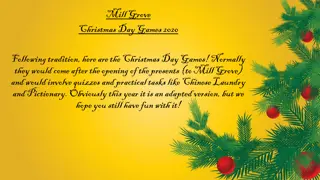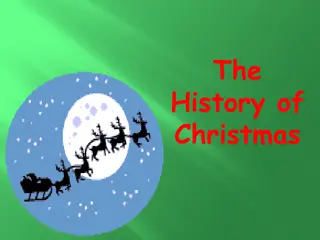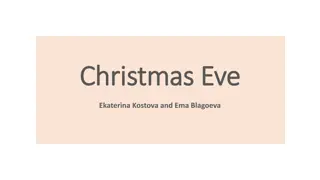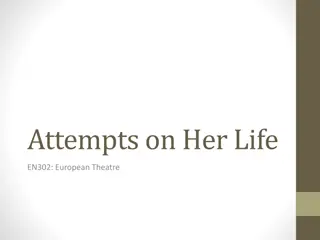Reevaluating Christmas: Origins and Traditions Examined
As we approach the holiday season, questions may arise about the true origins and traditions of Christmas. This article delves into the historical background and misconceptions surrounding the celebration, exploring whether it aligns with Christian beliefs and practices. Discover the origins of December 25th as the date of Jesus' birth, the significance of winter settings in biblical accounts, and the influence of man-made traditions on the modern observance of Christmas.
Download Presentation

Please find below an Image/Link to download the presentation.
The content on the website is provided AS IS for your information and personal use only. It may not be sold, licensed, or shared on other websites without obtaining consent from the author.If you encounter any issues during the download, it is possible that the publisher has removed the file from their server.
You are allowed to download the files provided on this website for personal or commercial use, subject to the condition that they are used lawfully. All files are the property of their respective owners.
The content on the website is provided AS IS for your information and personal use only. It may not be sold, licensed, or shared on other websites without obtaining consent from the author.
E N D
Presentation Transcript
Introduction Introduction As another year comes to an end, we face the holiday season that is called Christmas by many in our world. We are all affected by this day and the events surrounding it, and there are certain questions that may arise as we desire to serve the Lord and still participate in the secular aspects of this day.
Introduction Introduction Most people who have spent time studying God s word, have learned that Christmas is not found in its contents Perhaps you are wondering -Where does Christmas come from? -Can a Christian celebrate Christmas ?
False Reasons For False Reasons For Not Not Celebrating Christmas Celebrating Christmas The birth of Jesus is not important -Matthew 1:20-21 We don t want to honor and remember Jesus -Ac. 11:26; Rom. 16:16; I Cor. 11:23-26 We don t appreciate God sending Jesus -Col. 2:14-16; I Pet. 2:24; Heb. 9:15-17
#1 Christmas Is A False Tradition Of Man #1 Christmas Is A False Tradition Of Man It is commonly accepted that Christ was born on December 25th in the year 1 A.D. In 754 A.D. a Christian calendar was used to mark the center point in counting time with the birth of Christ at Dec. 25th, 1 A.D. King Herod who sought to kill Jesus with all males under the age of 2 died in 4 B.C. which shows that Jesus was born between 7 B.C. and 4 B.C.
#1 Christmas Is A False Tradition Of Man #1 Christmas Is A False Tradition Of Man Also, a winter month shows to be a false setting for the birth of Christ It is recorded in the Bible that the shepherds were with their sheep in the fields when Christ was born (Luke 2:7-18) Those knowledgeable of the Bible lands tell us that it is during the winter months that the shepherds bring their sheep into shelter, and are no longer in the fields with them.
#1 Christmas Is A False Tradition Of Man #1 Christmas Is A False Tradition Of Man So how was the 25th selected as the exact date of Jesus birth? Man s command! In 354 A.D. Liberius, who was the Bishop of Rome and a forerunner to the pope ordered that Dec. 25th be adopted as the date When Liberius wanted to keep those of pagan religions converting to Catholicism, he chose the date for the feast of the sun or winter solstice, celebrating light over darkness .
#1 Christmas Is A False Tradition Of Man #1 Christmas Is A False Tradition Of Man No celebration of Jesus birth was held until the first half of the 4th century So where did Christmas come from? It has it s roots in Catholicism. The manger scene comes from Saint Francis in 1224 A.D. who is highly esteemed by the Catholics as one of their saints
#1 Christmas Is A False Tradition Of Man #1 Christmas Is A False Tradition Of Man In several northern countries, the season s gifts come from a Saint Nicholas Saint Nicholas was a bishop in the fourth century and was known to protect children The children prayed to Saint Nicholas after his death, and believed that he answered their prayers with thousands of miracles
#1 Christmas Is A False Tradition Of Man #1 Christmas Is A False Tradition Of Man In the times of the reformation, the Protestants who wanted to keep the holiday simply removed Saint Nicholas for the Christmas man or Father Christmas Today we think of Santa Claus which is our English version of Saint Nicholas. Even the Dutch call Him Sinter Klaas. How many of you have ever sang: Jolly old Saint Nicholas, lend your ear this way?
#1 Christmas Is A False Tradition Of Man #1 Christmas Is A False Tradition Of Man With the red uniform, Saint Nicholas (Santa Claus) comes dressed in the color of the Bishop s robes of the Catholic church When we encourage our children to sit on Santa s lap and petition him for gifts, it is much like the tradition of having to address Saint Nicholas in prayer for gifts THINK IT OVER!
#1 Christmas Is A False Tradition Of Man #1 Christmas Is A False Tradition Of Man Christmas or Christ Mass is certainly of Catholic origin. The Mass is a re-sacrifice of Jesus by the priest as he lifts his hands to heaven to bring Him down. (Heb. 7:26-27) John A. O Brien said, The priest speaks and lo! Christ the eternal and omnipotent God bows His head in humble obedience to the priest s command What blasphemy!!!
#1 Christmas Is A False Tradition Of Man #1 Christmas Is A False Tradition Of Man The idea behind the reformation with the protestants was to protest the error of the Catholic church, while the restoration sought to remove all unbiblical practices in use. If we are willing to practice one of the innovations of the Catholics, why not practice them all! If we honor one Catholic saint, why not do the same for all of them. CONSISTENCY .CONSISTENCY
#1 Christmas Is A False Tradition Of Man #1 Christmas Is A False Tradition Of Man We need to be careful not to be involved with idolatry (Ex. 20:4-5) and the keeping of certain days religiously that are not found in the law of Christ (Gal. 4:10-11) While we have the freedom to esteem one day above another, we should not allow our liberty to cause us to sin, or cause others to stumble (Col. 2:16; Rom. 14:5-10)
#2 Christmas Has Ties To Paganism #2 Christmas Has Ties To Paganism It has been said by Compton s Encyclopedia: Old as our Christmas festival is, many of the customs and ceremonies associated with it are far older. They got their start thousands of years before the Christian era, for our pagan forefathers used to celebrate the winter solstice as the birth date of the sun.
#2 Christmas Has Ties To Paganism #2 Christmas Has Ties To Paganism Again Compton s Encyclopedia says: Christmas, it has well been said, is like a big sieve in which everything that was most beautiful, most significant, most potent, and most lively, both in heathendom and in Christianity, remained, while all that was small and trivial and outlived fell through and blew away
#2 Christmas Has Ties To Paganism #2 Christmas Has Ties To Paganism We must also acknowledge that the 25th of December was the birth date of not only the sun (so called), but 3 false gods (Bacchus, Osiris, and Apollo) Page 2070 of the Lincoln Library of Essential Information says, December 25th was already a festive day for the sun god Mithra and appealed to Christians as an appropriate date to commemorate the birth of Jesus, the light of the world
#2 Christmas Has Ties To Paganism #2 Christmas Has Ties To Paganism It is said of the Christmas tree that , Tree worship was common in the Scandinavian countries. When the pagans of Northern Europe became Christians, they made their sacred evergreen trees part of the Christian festival, and decorated the trees with gilted nuts, candles (sun worship carryover), and apples to stand for the stars, moon, and sun
#2 Christmas Has Ties To Paganism #2 Christmas Has Ties To Paganism It is believed that the Christmas tree custom is a survival of the tree worship of ancient German tribes that Our Christmas decorations of evergreens also came to us from pre-Christian times as they had their association with the early pagan festivals. Perhaps this is where we get the song O Christmas Tree and then sing about its beauty.
#2 Christmas Has Ties To Paganism #2 Christmas Has Ties To Paganism The mistletoe has similar associations with paganism as we read that, because of its peculiar character, the mistletoe played a prominent part in German and Norse mythology, and it was with an arrow from its wood that the beautiful god Balder was slain.
#2 Christmas Has Ties To Paganism #2 Christmas Has Ties To Paganism It is reported that The mistletoe was said to bring happiness, safety, and good fortune so long as it did not touch the ground We usually hang it above an entry way The Druids regarded the mistletoe with great reverence. Priests cut it out of the oak trees with a golden sickle and piled it on their altars and burned it as a sacrifice to their gods
#2 Christmas Has Ties To Paganism #2 Christmas Has Ties To Paganism The giving of gifts and the filling of stockings was a practice during the winter solstice as the fairy Befanna on that night is to fill the stockings of the children with gifts in accordance with their deserts, the naughty children received only ashes. Has anyone ever said that you might receive a lump of coal as a gift ? That is where it comes from.
Application Application For the longest time we have seen signs or heard people that say with the best of intentions : Put Christ back in Christmas OR Don t say X-mas say Christmas OR Jesus is the reason for the season etc. It is time for us to realize that Christ was never in Christmas and that it is a man made holiday, laced with paganism that cannot be practiced religiously
Application Application The secular nature of the day may be enjoyed such as: a day off, visiting friends and family, having a tree, decorating (Angels, vs. Snowman) sending greeting cards (Neutral), exchanging gifts, singing songs (Jingle Bells vs. O Holy Night), eating a meal etc. We need to be careful about binding a religious significance to the day, unless we involve ourselves in pagan man-made religion
Application Application In all of this, we do not want to take away the importance of Jesus birth, and the appreciation we have to God for sending Him It is because of His birth that He could die for the sins of the world. We remember Him every first day of the week (I Cor. 11:23-26)
Will You Receive The Salvation In Christ? Will You Receive The Salvation In Christ? -Hear John 12:48 -Believe John 8:24 -Repent Luke 13: 3, 5 -Confess Matthew 10:32-33 -Baptized Mark 16:16 -Faithful Matthew 24:13
This powerpoint was kindly donated to www.worldofteaching.com http://www.worldofteaching.com is home to over a thousand powerpoints submitted by teachers. This is a completely free site and requires no registration. Please visit and I hope it will help in your teaching.
